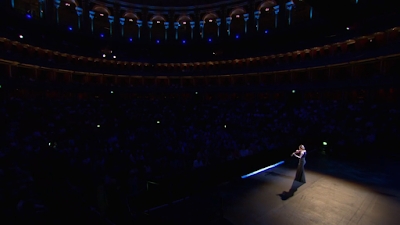Proms 2015 - week 3
I'm stealing a bit off the end of week two to allow me to cover an very important pair of late night concerts at the start of this post.
Prom 20 contained two things that would have me down to the Royal Albert Hall in a shot ordinarily. Juanjo Mena and Anton Bruckner. A visit was not possible this time sadly so I had to content myself with the radio and player radio. Schubert is something of a feature of Mena's programmes at the moment and his reading of the Fourth symphony was as noble and lyrical as one would want and the marshal element which is never far away in Schubert is well handled. Luke Bedford's new piece, "Instability", despite two auditions still alludes me - our modern condition needs a bit more to explain in than I found here I think. I love Bruckner but I have a blind spot when it comes to his Masses - I haven't found the ecstatic key to his devotional writing in a larger work. The soloists were grand and the choir, Orfeon Pamplones was very good. But even Mena's magic couldn't pull me in.
The Aurora Orchestra deserved better than a concert which got headlines because they played two Pastoral symphonies without music. These are some of the most exciting musicians and this is an artistic festival not Britain's Got Talent: we can do without stunts.
Verdi's Requiem started Donald Runnicles goodbye to the Proms as the Chief Conductor of the BBC Scottish Symphony Orchestra. During his tennacy of the chair has maintained the very high standards of the orchestra and taken it to new and bigger heights. I've begun to enjoy his conducting more and more over recent years - it seems to me he's relaxed more and more. This was a fine, big boned, old-fashioned barn stormer and the four soloists and huge choir from the Deutsche Oper Berlin filled the hall and were allowed to make the most of verdi's lines by Runnicles and took the opportunity.
The next night was of more import. Sir James MacMillan's Fourth Symphony and Mahler's Fifth made a fitting end to Runnicles time at the helm (though I expect him to be back). MacMillan - who has conducted this orchestra on many occasions - spoke of imagining the individual players tackling the parts of the symphony. This might have been Haydn and Mozart's method too. The symphony is a grand gesture from MacMillan and throws light on his early works including the St John Passion. It is dramatic, colourful, abrasive at times and serene in it's core despite a turbulent progress. That its dedicatee also gave it's premiere is only right, that he did so as a powerful advocate for Scotland's finest composer - typical of both men and of music making this orchestra promotes. Mahler Five is a symphony I can take or leave now. Runicles didn't do a Bernstein on it - thankfully - but nor did he hit Mahler's abundant sense of irony on the head. Ardent advocacy can have its downside in the lesser music of great composers - my view is that beyond the fascinating second and third movements this symphony can easily become melodramatic in the hands of conductors who are too earnest.
Sir John Eliot Gardiner's Orfeo with a pack of fine young soloists all of whom had passed JEGs scrutiny in terms of their grasp of Italian, the vivacious Monteverdi Choir and the English Baroque soloists was one of the best things I've heard at the Proms in terms of early opera. I don't know the work at all but the bright rhythms, seductive orchestration and heartfelt singing brought the piece straight into my listening room with style, feeling and drama. Delightful.
Finally in week 3 - Oliver Knussen conducted a programme that was a model of pairing the new or nearly new and the crowd pleaser to ensure maximum impact for all the pieces. A gleeful but powerful Sorcerer's Apprentice was paired in the first half with Mark-Anthony Turnage's On Opened Ground - his Viola Concerto. Lawrence Power was the powerful soloist in a work that was premiered in Cleveland in 2002 but only received it's Proms first performance this season. Like much of Turnage the work rewards listening hard it's episodes roar and muse in turn and it has a distant and mysterious ending its inspiration Seamus Heaney right have enjoyed. the second half was more moving still, it started with what was intended to be a 90th birthday tribute to the composer of the first piece, Gunther Schüller. His Seven Studies on Themes by Paul Klee was eloquently introduced by the composer himself on Radio 3 in a talk from the 1960s (in this way radio excels over being in the hall now and again). Schüller died earlier in the year and so this became a tribute by one composer to another, his friend. It was beautifully done. There's nothing easy about Schüller's language but his message comes through by turns of wonderful orchestration, structure and for want of a better word, feeling. The BBCSO excel in this kind of work under Knussen as the BBC Phil do under Gruber - we are lucky to have them both but hear far too little of the either in these wonderful works of sth last 50 years. Seven Studies was - unaccountably - getting it's Proms premiere. Finally Knudsen gave us a favourite, Scriabin's Poem of Ecstasy - wonderfully placed and a balance of great transparency in the bay, but once we got into the open heavy swell of the climax I felt for the BBC engineers - it came over very well - not least the organ. What a grand and fascinating concert to end this week.



Comments